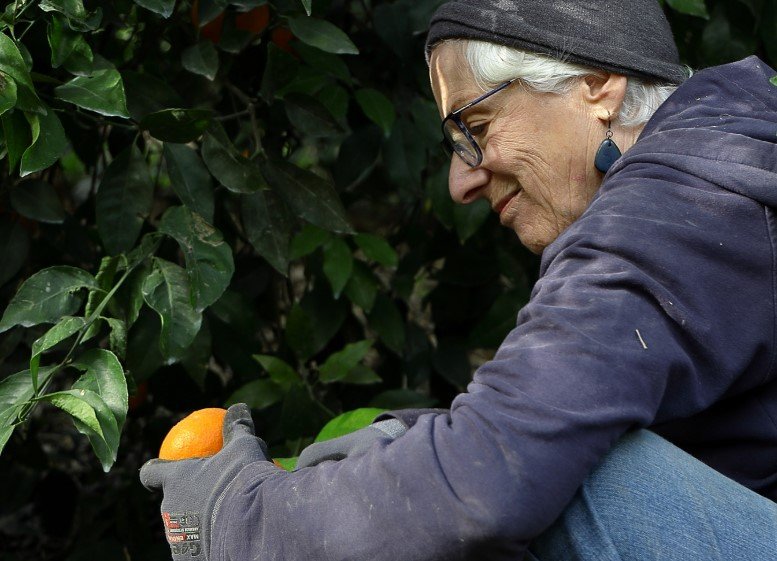From harvesting fields to packing meals, American retirees step up to aid post-October 7 efforts across Israel
A retired couple from the U.S. recently wrapped up a month-long volunteering trip across Israel — their second in as many years — and what they saw, did, and felt paints a powerful picture of global solidarity in action. This wasn’t a guided group mission. No organization sent them. They showed up on their own and simply asked, “How can we help?”
And help, they did — on farms, in kitchens, and in food banks, from the quiet northern city of Nahariya all the way to the war-strained communities near the Gaza border.
Filling Labor Gaps Left in the Wake of Crisis
Agriculture in Israel has taken a hard hit since the Hamas attacks on October 7. Thousands of foreign workers left the country. Many local laborers were called up for military service. That left acres of farmland with nobody to tend it.
That’s where Leket Israel stepped up — and where these senior volunteers, along with hundreds of others, stepped in.
Leket, a national food rescue organization, quickly expanded its work to support the country’s farmers. Before October 7, the group focused mostly on rescuing surplus food from hotels and cafeterias. Now, they also organize busloads of volunteers to head south, picking citrus and planting tomatoes. The buses leave as early as 6 a.m., and they’re packed with people from all walks of life.
“It wasn’t just retirees like us,” the couple shared. “There were college kids, tourists, and Israelis. We met people from Canada, France, Brazil — everyone was there to work.”

Getting There Was Part of the Mission
Traveling across Israel with backpacks and a phone loaded with Google Maps, the couple made their way by train and bus, choosing to stay near pick-up points for early volunteer trips. They weren’t part of a program. They figured it out on their own.
That choice brought them flexibility, but also a deeper kind of connection. They saw the country in between the destinations, spoke with locals on the trains, grabbed coffee at small kiosks near bus stops, and moved at their own pace.
They also saw the real, unvarnished Israel — from Tel Aviv’s humming streets to the haunting stillness near the Gaza perimeter.
Beyond the Farms: Feeding a Nation in Need
While Leket handles farms and food collection, another group — Pantry Packers — helps assemble and distribute that food.
Based in Jerusalem, Pantry Packers builds care packages and family-sized food boxes, many of which are filled with items donated or recovered by Leket. The synergy between these two organizations is impressive, and it’s practical. Every day, trucks crisscross the country making deliveries.
At the Pantry Packers facility, they were shown a walk-in cooler stocked with individual, ready-to-go meals. Those meals had come in earlier that same day from Leket’s operations. By the end of the afternoon, many were already en route to families in need.
One sentence stood out during their visit: “No food should go to waste — especially now.”
• Volunteers helped pack meals that were delivered the same day they were prepared
• Food donations included rescued leftovers from corporate kitchens and catering halls
• Pantry Packers also supplies dry goods like rice, flour, oil, and canned vegetables
The People Make the Difference
What stayed with them more than the work itself were the people.
On one farm in the south, they picked pomelos alongside a 19-year-old from New Jersey and a grandmother from Argentina. The fields were quiet but the conversations weren’t.
One bus ride turned into a group chat with new friends from Australia. Another day ended with coffee shared with an Israeli soldier’s parents who had joined to volunteer as well.
Everywhere they went, they felt not just welcome, but needed.
“People thanked us like we were heroes,” they said. “But we were the ones who felt honored to be there.”
Even the farmers, often too tired to talk long, would stop just long enough to say, “Toda. Thank you. You don’t know what this means.”
Why They’ll Keep Going Back
Some people take cruises in retirement. Others travel to relax. These two choose to go to a country still healing, still scared, and still hoping.
And they’re not alone. Senior volunteering in Israel is gaining momentum, especially among Jewish communities in the U.S. But faith isn’t a requirement. Compassion is.
They found the work online, reached out by email, and made all their own arrangements. For others considering it, they recommend the same.
Here’s a snapshot of their volunteer week:
| Day | Activity | Location |
|---|---|---|
| Monday | Fruit picking (Leket) | Near Ashkelon |
| Tuesday | Meal packing (Pantry Packers) | Jerusalem |
| Wednesday | Field clearing for planting | Sderot area |
| Thursday | Sorting dry food donations | Tel Aviv suburbs |
| Friday | Delivery help to elderly homes | Haifa |
Even with aching backs and sore knees, they’re already planning their next trip.
The Work Still Needs Doing
Despite growing volunteer interest, the need continues. Israel’s recovery is long-term, especially in the agricultural sector. Government estimates from early 2024 suggest the country lost over 60% of its seasonal harvest workers after the October attacks. Many farmers have replanted only half of what they once did.
The volunteers witnessed fields left unpicked, greenhouses needing repair, and fruit going bad on trees.
That’s what drives them to return. Not just the people — though that’s a big part — but the sense of unfinished work. It’s a cause that grabbed their hearts and didn’t let go.
